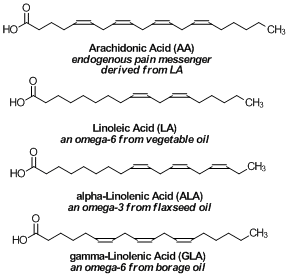The science behind fish oil benefits
The biological master key behind fish oil benefits is surprising and almost bizarre: they make pain less potent.
If you suffer from an inflammatory disease like asthma, cystic fibrosis, rheumatoid arthritis, Crohn's disease, or inflammatory bowel disease, then you are probably always on the lookout for something that can help manage your symptoms. These diseases can be terribly frustrating to deal with, because your health in general is good, except when the pain starts flaring up. There are some very good reasons why increasing your omega-3 intake can help you manage these diseases. In this article, we'll explain the science behind omega-3s and inflammation, and we'll cover what kind of clinical evidence supports omega-3 supplementation for inflammatory disease.

During inflammation, various PUFAs in the cell membrane are converted into pain messenger molecules. These compounds create an inflammatory response of swelling, blood vessel constriction, and coagulation. The funny thing here is that some pain messenger molecules are more potent than others. Omega-6 fatty acids like linoleic acid produce the potent pain messenger arachidonic acid (AA). AA is starting point of the pathway that painkillers like ibuprofen act on. And shifting your fatty acid balance from omega-6 linoleic acid (LA) towards omega-3's EPA and DHA, particularly EPA, biases your system towards less potent pain messengers.
Gamma-linolenic acid also reduces inflammation
In fact, shifting your dietary fat balance towards DHA and EPA does more than that. Recent research has identified a class of compounds related to fish oil benefits called resolvins. Fish oil components EPA and DHA are converted to resolvins during inflammation, especially in the presence of aspirin. These two families of compounds have been shown to reduce the harmful effects of inflammation, and may even explain why omega-3's and aspirin have shown synergistic effects in the clinic.


As with many promising leads from the laboratory, the translation of basic science behind fish oil benefits into the messy world of clinical research has hardly been smooth. The one inflammatory disease where the evidence has been particularly strong for fish oil benefits has been rheumatoid arthritis. A review of 14 double-blind clinical trials (1) showed robust evidence for the omega-3's in the management of rheumatoid arthritis. The evidence on prevention is much less clear.
Fish oil benefits: the inflammation-depression connection
The bottom line for this stuff is that if you're faced with an inflammatory disease, or even just someone like an athlete who deals with more than your share of inflammation, omega-3 supplementation makes sense. It's also important to know that the efficacy studies quoted here rely on fairly high doses of omega-3's. So if you are taking the stuff, go for the triple strength DHA/EPA-- you're going to want to get about a gram of DHA/EPA in your system each day.![]()
References:
1. Cleland, LG, James, MJ, Proudman, SM. "The role of fish oils in the treatment of rheumatoid arthritis." Drugs. 63 (2003) 845-53.


